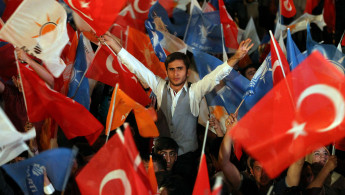Erdogan's AKP loses its parliamentary majority
Turkey's ruling party lost its parliamentary majority in Sunday's legislative elections, dealing a severe blow to strongman President Recep Tayyip Erdogan's ambition to expand his powers.
The Justice and Development Party (AKP) won the biggest portion of the vote in the closely-fought elections, but its 41 percent share was a sharp drop from the last polls in 2011, when it won nearly half the vote.
Big wins for smaller party
Under Turkey's proportional representation system, this means the AKP will need to form a coalition for the first time since coming to power in 2002.
In another sensational result that shakes-up Turkey's political landscape, the pro-Kurdish People's Democratic Party (HDP) easily surpassed the 10 percent barrier needed to send MPs to parliament.
Official results based on 99.9 percent of votes counted put the AKP in the lead, followed by the Republican People's Party (CHP) on 25 percent, the Nationalist Movement Party (MHP) on 16.5 percent and the HDP in fourth place with 13 percent.
The AKP has dominated Turkish politics since it first came to power in 2002, but has suffered from a dip in economic growth and controversy over Erdogan's perceived authoritarian tendencies.
The results wreck Erdogan's dream of agreeing a new constitution to switch Turkey from a parliamentary to a presidential system that he had made a fundamental issue in the campaign.
Such a change would have required a two-thirds majority in the parliament.
"The AKP did not lose the elections but Erdogan lost all hope for turning Turkey into a presidential system," university professor Ahmet Insel said.
Erdogan was prime minister between 2003 and 2014 before becoming president.
The position was largely ceremonial until his arrival as president, and his growing sense of authoritarianism has been criticised.
Erdogan was likely to seek another presidential mandate to stay in power until 2024.
Coalition options
Ahmet Davutoglu, prime minister, spoke to a crowd from the balcony of the AKP headquarters in Ankara - the - traditional place for the party's victory speeches.
"The winner of the election is again the AKP, there's no doubt," he said. "Our people's decision is final. It's above everything and we will act in line with it."
The result was, however, a triumph for the HDP, which in the campaign had sought to present itself as a genuinely Turkish party and reach out to voters beyond its mainly Kurdish support base.
| Now the HDP is a real party of Turkey. HDP is Turkey and Turkey is HDP. Selahattin Demirtas, HDP leader |
Celebrations took place in Kurdish-majority areas of Turkey, when the election results came out.
The party's leader, Selahattin Demirtas said, "We, as the oppressed people of Turkey who want justice, peace and freedom, have achieved a tremendous victory today," Demirtas told a news conference in Istanbul.
"Now the HDP is a real party of Turkey. HDP is Turkey and Turkey is HDP," he said.
Demirtas ruled out joining a coalition government with the AKP and said the HDP would make up a "strong and honest opposition".
Analysts believe that the nationalist MHP is the most likely coalition partner for the AKP in the new parliament.
The MHP's leader Devlet Bahceli did not shut the door on a coalition but said the results represented the "beginning of the end for the AKP".
Should the sides fail to form a coalition, new elections could be a real possibility and by law could be called any time 45 days from now.
Erdogan's heavy involvement in the campaign in favour of the AKP had been controversial, given that as head of state he is required to keep an equal distance from all parties.
The legislative election took place under the shadow of violence, after two people were killed and dozens more wounded in an attack on an HDP rally in Diyarbakir on Friday.
News that the AKP had not succeeded in winning a majority led to shares falling by six percent on Monday morning.
The Turkish lira also fell by four percent, amid uncertainty in the market about the new government.
Turkey's economy, which has experienced a boom over the past decade, saw growth slowing to three percent in 2014.





 Follow the Middle East's top stories in English at The New Arab on Google News
Follow the Middle East's top stories in English at The New Arab on Google News
![The UAE is widely suspected of arming the RSF militia [Getty]](/sites/default/files/styles/image_330x185/public/2024-11/GettyImages-472529908.jpg?h=69f2b9d0&itok=Yauw3YTG)
![Netanyahu furiously denounced the ICC [Getty]](/sites/default/files/styles/image_330x185/public/2024-11/GettyImages-2169352575.jpg?h=199d8c1f&itok=-vRiruf5)
![Both Hamas and the Palestinian Authority welcomed the ICC arrest warrants [Getty]](/sites/default/files/styles/image_330x185/public/2024-11/GettyImages-2178351173.jpg?h=199d8c1f&itok=TV858iVg)